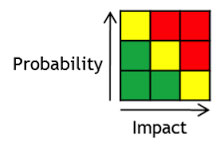There is no forward progress without some sort of plan. When we start making moves towards future goals, we anticipate the good, the bad and the ugly. This is called risk analysis and it is a necessary part of the process.
Big projects have this calculated into their costs, time management and outcomes. It’s preparing for unforeseeable situations that may or may not arise. Exploring a development from this angle allows us to accommodate for the weather, cost, materials, safety, damage and time-delays.
Tenders for the construction of buildings have weather and material delays calculated into their itemised figures. Each venture will have it is own unique dynamics and requirements.
When we break a plan up into small achievable steps we can apply risk analysis to these same phases. Never underestimate this process as simply calculating a few disappointments along the way. This part of the project prepares the mind for the unanticipated. It allows us to manage whatever arises, whether it was forecasted or not.
When we break a plan up into small achievable steps we can apply risk analysis to these same phases. Click To Tweet
The wedding day is an example of a project divided into smaller tasks and time allocations. As the day draws near the bride takes on an enormous amount of pressure wanting to leave nothing to chance. For this very reason many a bride have been labelled Bridzilla. The expectation is for the big day to run smoothly.
Although everyone knows that even the best made plans have the potential to go astray. A wedding is fueled with many emotions. When something does not go according to plan, it’s like the bride has left and some crazy person has taken her place.
Had the Bride erased those emotions, acknowledging she had done all she could to ensure her special day would be memorable; she would have managed any issue without seeing it as a glitz in the system. The Bride had organised every last detail and without her even knowing it, she has applied risk management.
You speak with anyone who has planned for the unexpected, they will confirm they had researched and thought of every likely situation that could possibly go wrong. Some even lost sleep over it and were scared witless with their imagination at work.
As the project progresses, none of what was anticipated occurred. Although there were problems requiring analysis and action that had not been calculated. These particular situations could not have been dreamed up even if they had used a crystal ball.
Introducing the imagination.
A part of my planning process is to allow my imagination to run away with an idea for a while. My dreams begin with optimism. Usually this is where I become some sort of hero who has saved many unfortunate souls. Then my vision will reverse and I become the villain, attempting to dominate world leaders. And then my mind will go in a completely different direction, where I fail or I am humiliated or embarrassed.
Why do I indulge in such an activity? This creative part of my mind alerts me to my fears and shows me that I am aiming for a positive outcome. When my brain automatically day dreams about the project possibilities – this shows me my processors have already began. I may not have even picked up a pencil, typed a word about the project; discussed the idea out loud or with a team. But if my imagination is at work, I know I am invested in the project. But this serves only a small purpose.
This is not a waste of time. Some of what was imagined can be penciled into the risk analysis. This activity shows me the progressive possibilities and prepares me for some of the negatives. However once I begin this project I want to see it without my imagination or emotion. Now it’s time to apply the logical and practical component of the mind to the plan. Every part of my brain that requires stimulation has been accommodated.
Risk analysis reduces the impact of danger.
When you are riding the dodgem cars the safety barriers are what stop you from escaping the allocated area or running over other people. There is heaps of potential for things to wrong inside this confined space. The signs placed around the arena say, ‘don’t leave your seat’. You hear an announcement over the loud speaker repeating this.
One of the participants smashes into a barrier, they are unable to move and have to wait for assistance in order to reverse the car to start driving amongst the other lunatics. The helper is taking too long and this eager driver wants to get back to having fun.
The individual gets out to push their car away from the barrier. As they do, one car smashes into one side of his foot and another does the same on the other side.
Participants are advised not to get out of the car because risk of them being hurt is calculated. However people don’t always follow the rules to accommodate the danger. The result can often be human error and/or injury.
Planning for the unexpected.
Even when our predictions go horribly wrong and something comes up that we had not been prepared for; we can feel confident that we will be able to manage it regardless of the issue. Spending time on risk analysis organises our mind for these situations.
If you remain true to the plan and are not fudging figures or over exaggerating your skill set, you are prepared. One would always hope you are being genuine in your calculations as your reputation is connected to these projects.
One would always hope you are being genuine in your calculations as your reputation is connected to these projects. Click To TweetWhen a blow out in the project occurs it has the potential to raise our stress levels. It is vital at this stage not to get caught up in a pity party and allow doubt to settle in. First allow your mind a few moments to get back to balance. Making decisions after you have separated your emotions will achieve better results.
Not all calculations will be correct, not all budgets will go to plan. Having the confidence to rely on your own ability is what got you to this very point. Trusting that our learned intelligence and experience will give us the answers to rectify anything that arises.
Having the integrity to go in search of the answers will put the project back on track. Being stuck on the problem rather than finding a solution is wasting time. Look for accountability once the project is back on track. Priority is to fix what is broken first.
Calculated risks are always exciting. There is a make or break outcome to this process. This motivates us to work harder, longer and stronger to ensure we don’t fall down. And when we do, it really is nothing more than a redirection.
One should be grateful. It may seem time consuming, the additional costs may make us cringe, but a redirection highlights we may have been going down the wrong path.
When it feels right manage what feels wrong.
If there are individuals that surround you and claim to have your best interest at heart but are advising you against your project or giving you other ideas – one should question their motivation for such negative talk rather than support. If you take on their comments then maybe the project was not for you.
However if they are attempting to talk you out of your project and you say, ‘I will take that on board’, or you feel they just don’t understand – then you are ready.
Your adversaries are nothing more than little tests along the way whispering, ‘do you really want to go there?’
Your adversaries are nothing more than little tests along the way whispering, 'do you really want to go there?' Click To TweetWhy self-doubt is a waste of time?
You have already played with doubt. You indulged it whilst using your imagination. Your risk analysis has penciled some of this hesitation into the prediction. You have done your due diligence.
Self doubt is an emotional attachment that has no benefit to your cause. Ignore it until it can’t be heard anymore. It is of no service to you once the project is underway.
Regardless of how big or small the project – risk analysis prepares us for what can and probably will go wrong. Experience has always shown me that what I have prepared for won’t be the issues I need to address. It will be something completely unexpected. But I am prepared nevertheless. My skill set has got me this far, it will get me through whatever it is that requires thought, discussion, action or new direction.
If you enjoyed reading this post, don’t forget to share it with those who may benefit.



Now, this is what I call a brilliant post.
I love the way you have epxlained the idea of risk management with the help of marriage example. Ya, there are lots of things we need to cover before working on big occasions. After doing all the arrangements, there is always an loophole which rises our stress levels. As a result, we need to be prepared for the odd circumstances.
Risk Management is important for the growth of an individual. The person learns the skills in the stressful phase, isn’t? In those moments only, one recognizes the strength and weakness. As you mentioned in the post, risk management helps in reducing the danger. It prepares us for any upcoming dangers. Thanks for coming up with a wonderful post, buddy 🙂
Yatin Khulbe recently posted…Be careful of these 8 Common Myths Before Starting Your Dream Business
Hey Yatin,
Big smile at seeing you at my blog.
There is always a loop hole in our projects and yes it does raise our stress levels and that is why we plan and prepare our mind. Experience has shown me that we never can really calculate for the unforeseen, but we are so prepared when we apply the ‘what if’s’ to a scenario. But you are so right when you say it shows our strengths and weaknesses. I normally can manage any stress head on and fall a part after I have cleaned up the mess. But that is not a problem because when action is required that is when I perform – stress in some circumstances really gets me moving.
And isn’t odd when our friends are going through their stress in their projects we can manage it with calm and clarity. That is because we are not attached. So I think it has something to do with being invested and dedicated to the project. And why would you not be. Thanks Yatin for your wonderful feedback. Have a swell week. Talk soon.
Rachel.
Hi Rachel
I am amazed at how you take a complex topic and make it so easy to understand. I love the way you discussed Risk Management in such a way that it is so interesting using examples like marriage and dodgem cars.
As you have highlighted, each goal and project one takes, there is a form of risk analysis involved otherwise one leaves his situation to chance. It is neccessary to one prepares his mind and emotion for any situation which is why everyone needs to take risk analusis so serious.
Hats off to you Rachel and thanks for sharing. Take Care.
Hey Ikechi
Always a delight to see you here.
I agree, nothing should be left to chance. Risk analysis is a thrilling task to calculate and even better when it is actioned.
Even blogging has elements of risk. The trolls, things going wrong with our blogs, managing a thousand new tasks without burnout. Balancing that with our other priorities so our family and friends don’t miss out on us or feel neglected, creating havoc. In my risk analysis for blogging I calculated the times when I would think about giving up, I researched this and thought about it for many a nights.
But what a feeling when we pull something off hey Ikechi? When things start to go right, then we realise that preparation was key and as you say so serious.
Big projects are my favourites because there is always a risk that they won’t be finished unless there is a clear strategy. And when things don’t go according to plan and we get through them, what a sense of relief and forward marching. Looking for what is next. As bloggers we are all so progressive, so planning and analysing are a part of our skill set. Thanks for the wonderful comments.
Rachel.
Hi Rachel,
Another great and thought provoking post. I have been watching a TV series in the UK that often demonstrates that the participants had not done any risk assessment first. Business people go on the program to ask a panel of influential investors for some money and a percentage of their business.
Some are very prepared and can manage to answer the investors probing questions well while others seem to be completely blindsided and fall to pieces. I’ve often thought that surely they must have watched the program and would know that it’s not all plain sailing. Their outcomes might have been so different if they had done some risk assessment beforehand.
Funny you should mention blogging in your reply to Itechi above as that sprung to my mind when I was reading your post.
Sandy Halliday recently posted…Should You Detox Your Body From Glyphosate Weedkiller?
Hey Sandy,
Always wonderful to see you.
I know the show you are talking about I have seen bits of it myself. At points of have been in shock at how these people invested so much time in their projects, but it seemed that they really weren’t as prepared as they should have been. It is like they give it their all for a time and are tired and think they can swing it. It is shows there is lack of preparation in areas. Because when we have our own product we want to stand for it, sell it with our all, any adversity we still stand strong.
Like you say, they would have watched the show and yet still seem dumbfounded by some of that probing. While I would be nervous about being in the show, I would never doubt my product for if I did I would never have put myself in such a situation.
They have a saying in Toastmasters – An unprepared speaker should be scared. In business we have to assess risk but we never have to stilted by it. I just get very excited by this subject because I can never stress enough preparation is key. When things do go wrong when we have prepared but we miscalucate the issue that arises, we are still more than prepared. Thanks Sandy, I always enjoy your comments. Talk soon.
Rachel.
Well most of the time people don’t even consider project management for their small projects. But I guess to save a lot of time later it is good to do so, and also having a good look at upcoming risks can help.
Hey Usman,
Welcome, it appears this is your first time to my blog.
It does not matter the size of the project, preparation is key. I don’t know about you but when I start anything new it is never how I imagine it will turn out, because our we are learning while we are doing. So when we hit a wall or have some hurdles to jump regardless of if we calculated them before we began our mind is ready. Risk management or calculated risk is just preparation. Don’t you think. Thanks for the comments. Talk soon.
Rachel.